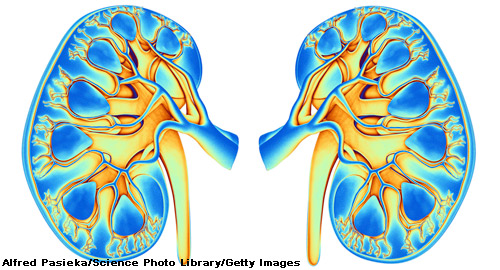 Throughout the world, IgA nephropathy stands as the most common type of primary glomerular disease. Although the medical community agrees there is an autoimmune basis for IgA nephropathy, the genetic and molecular mechanism underlying pathology are not well understood. However, the fact that IgA nephropathy is an immune-complex-mediated glomerulonephritis has led researchers to suggest that immunosuppression, particularly corticosteroids, may be an effective treatment.
Throughout the world, IgA nephropathy stands as the most common type of primary glomerular disease. Although the medical community agrees there is an autoimmune basis for IgA nephropathy, the genetic and molecular mechanism underlying pathology are not well understood. However, the fact that IgA nephropathy is an immune-complex-mediated glomerulonephritis has led researchers to suggest that immunosuppression, particularly corticosteroids, may be an effective treatment.
Unfortunately, a new study found that treatment with oral methylprednisolone is associated with an increased risk of serious adverse events in patients with IgA nephropathy and proteinuria of 1g/d or greater. Jicheng Lv, MD, of the Peking University First Hospital in China and colleagues report that these patients are particularly at increased risk for infections. In their research, published Aug. 1 in JAMA, investigators note that the results are also consistent with potential renal benefit from treatment.1
Researchers designed the Therapeutic Evaluation of Steroids in IgA Nephropathy Global (TESTING) trial to assess the effects of a full-dose corticosteroid regimen on patients with IgA nephropathy. Physicians enrolled patients in this investigator-initiated, multi-center, double-blind trial if they had an estimated glomerular filtration rate (eGFR) between 20 and 120 mL/minute/1.73m2, urinary protein excretion greater than 1 g/day and were diagnosed with primary IgA nephropathy based on kidney biopsy.
The investigators intended to enroll 750 patients across China, Australia, India, Canada and Malaysia. However, when data revealed a nearly five times higher risk of serious adverse events in the treatment group, the researchers terminated the study prematurely, and thus, the study only enrolled 262 patients. Specifically, in the group of patients randomly assigned to receive oral methylprednisolone (n=136), 14.7% experienced one or more treatment-related serious adverse event, which contrasts with the 3.2% seen in the placebo group (n=126). The treatment group experienced 13 infections, two of which were fatal; whereas the placebo group experienced no serious infections.
The five-fold higher risk seen for serious adverse events was in contrast to the statistically significant three-fold lower risk for kidney failure. The patients were followed for a median of 21 months, and during that time, only eight patients in the treatment group progressed to 40% reduction in eGFR or end-stage renal disease or death resulting from kidney disease; whereas 21 patients in the control group made that progression. The treatment group also appeared to have an early increase in eGFR, which led the authors to suggest that some of the eGFR effects from corticosteroid therapy may be from sarcopenic effects of corticosteroids or corticosteroid-induced hyperfiltration.

